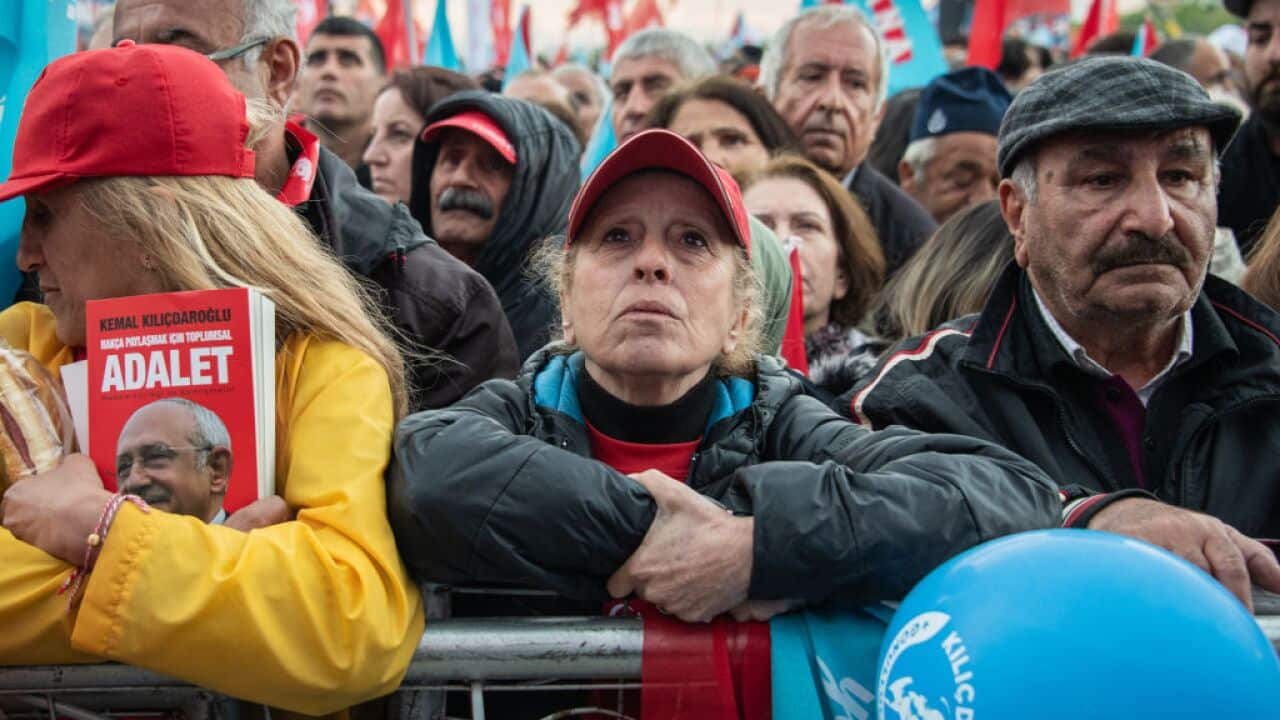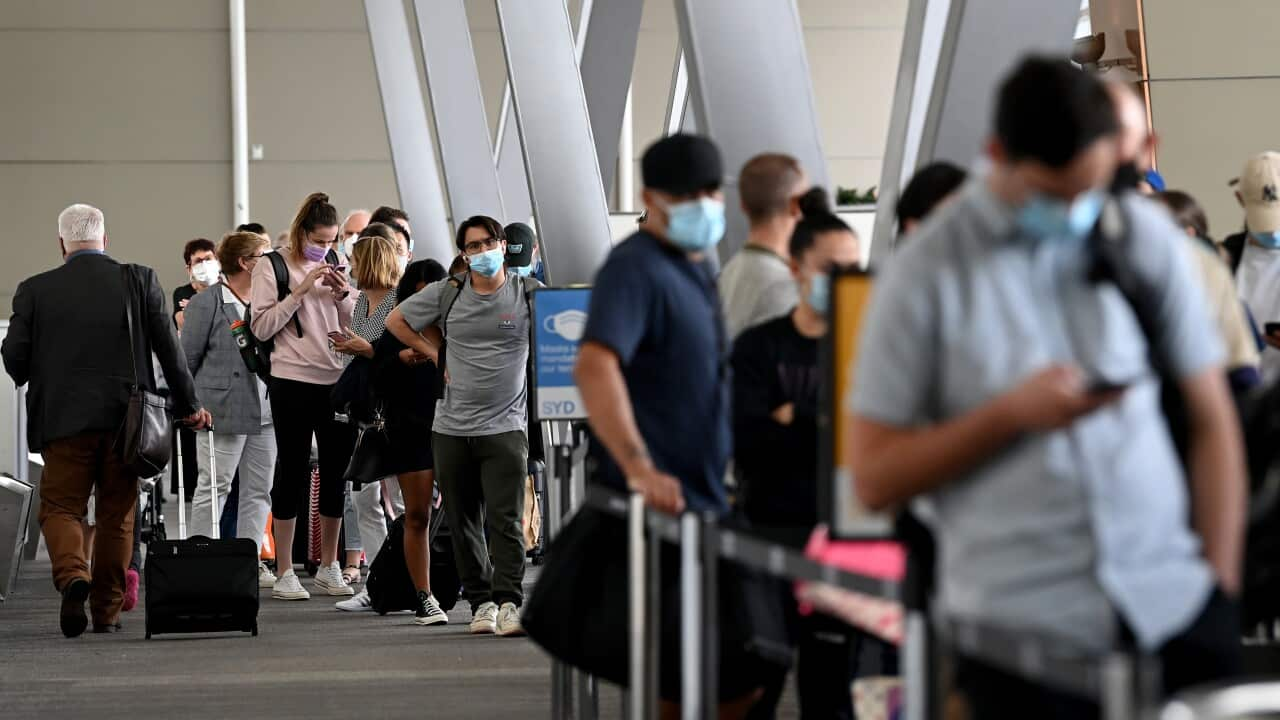Key Points
- Türkiye will go to the polls on Sunday to pass judgement on President Recep Tayyip Erdoğan.
- Mr Erdoğan has been in power for more than two decades.
- His popularity has declined due to Türkiye's ongoing economic crisis and his handling of the earthquake response.
Türkiye will go to the polls on Sunday in a tense election that could be the nation's most consequential in generations and the toughest of President Recep Tayyip Erdoğan's career.
The transcontinental country is in the midst of a crippling economic crisis and is still rebuilding after a devastating earthquake in February that left 50,000 people dead.
Mr Erdoğan has been in power for two decades, first as prime minister then as president from 2014. Since then, a tailor-made constitution has allowed him to cement his power as the country's longest-serving leader.
But in 2023, the president and his Islamic-rooted Justice and Development Party (AKP) are equally abhorred as adored.
So who exactly is Mr Erdoğan, who supports him, and to what extent has the earthquake response ruined his election chances?
And what could the election result mean for Türkiye?
Who is Recep Tayyip Erdoğan?
Mr Erdoğan was raised in a poor, conservative Muslim family in Istanbul's working-class district of Kasimpasa.
He is staunchly conservative, his politics guided by his strict Muslim faith. He frowns on smoking and drinking, defends traditional family values at the expense of the LGBTIQ+ community and emancipated women, and advocates the wearing of headscarves.
Mr Erdoğan has tried to propel Türkiye into the 21st century through large-scale infrastructure investments. These include a towering bridge over the Bosphorus Strait, Türkiye's largest mosque designed to hold 30,000 worshippers, the Istanbul Canal, power plants, a high-speed railway and a third Istanbul airport, designed to be the world's largest.

Controversial president Recep Tayyip Erdoğan is Türkiye's longest serving leader. Source: AAP
"He is a very religious man, with grand ideas about Türkiye's place in the world," Vedi Hadiz, professor of Asian Studies and director of the Asia Institute at the University of Melbourne, explained to SBS News.
"He has a growing authoritarian streak and can’t stand criticism."
Is he likely to win?
Experts say it's too close to call.
The largest opposition is the centre-left Republican People’s Party (the Turkish acronym for which is CHP), which was formed by the founder of Türkiye's secular republic Mustafa Kemal Ataturk and is led by Kemal Kilicdaroglu.
The CHP has aligned itself with other nationalist and conservative forces in a coalition called the Nation Alliance.
Professor Hadiz says a fragmented opposition may not be enough to defeat Mr Erdoğan and his AKP.
"Erdoğan benefits from a fragmented opposition," he said. "I would say his chances are 50-50."
Professor Ihsan Yilmaz, research chair in Islamic Studies at Deakin University, says for the first time in 20 years, Mr Erdoğan "is not confident", which is due to the poor state of the economy.
Türkiye's economy has been in a downward spiral since a referendum in 2017 gave Mr Erdoğan sweeping powers as president. Over the last year, he's been keeping interest rates low in the belief that higher borrowing costs lead to higher prices — contrary to established economic theory and monetary policy in most countries around the world.
As a result, inflation in the country has soared to around 80 per cent while unemployment has grown to over 10 per cent.
"Normally, in this context, the ruling party would lose most of the votes, but Erdoğan's party is still getting around 35 to 40 per cent support because he controls 90 per cent of the media," Professor Yilmaz told SBS News.
Who are Mr Erdoğan's supporters?
Professor Yilmaz says the president's supporters are mainly uneducated people in rural regions or working-class urban areas.
"They believe in his narrative, that the opposition is ruled by the Western imperialists who hate Islam. He portrays himself as the leader of the Muslim world and opposition figures as puppets and pawns of the West."

Türkiye's President Erdoğan will face his biggest electoral test in the country’s upcoming general election. Source: Getty / Burak Kara
The political alignment of the millions who make up the Turkish diaspora — and who have already voted — is divided, Professor Yilmaz says.
"Those who went to continental Europe as workers in the 50s or 60s are predominantly from rural areas, are likely to be uneducated people and more likely to vote for Erdoğan. But if you look at England, the United States and some other parts, these are the white-collar educated diaspora who are less likely to vote for Erdoğan."
When contacted by SBS News, the Australian Turkish Mutual Alliance said it worked to promote and protect Turkish culture in Australia, and "has nothing to comment" regarding Türkiye's elections.
How much did the earthquake response hurt Mr Erdoğan?
To some extent, but not fatally, experts say.
Professor Hadiz says the disaster revealed the years of mismanagement and corruption in the construction industry, where associates of Mr Erdoğan had been appointed to positions of authority.
"The damage caused by the earthquake clearly revealed years of hidden mismanagement via cronyism," he said.
"But while it hurt Erdoğan, it didn't do so fatally."
Professor Yilmaz says the cities affected by the earthquake are predominantly in the AKP's heartland. But while there was anger over how poorly the infrastructure could withstand the quake, the destruction wasn't enough to significantly dampen support for the president.
"The people who were angry were already angry with him. So the earthquake didn't change much," he said.

A massive 7.8-magnitude earthquake rocked huge swathes of Türkiye and parts of Syria in February. Source: Getty / AFP / Ozan Kose
"He simply framed it as an act of God. He said people who die will go to heaven."
Since the disaster, Mr Erdoğan has positioned himself as a hero by rebuilding houses at speed, thanks to his construction industry contacts.
"He has actually been very good at building because his cronies are all in the construction industry. So his voter base knows that he can deliver, that he can build these houses very quickly. But he has been framing laws, regulations and environmental concerns as barriers to development.
"He's also been pumping a lot of money into the economy and to these people who suffered from the earthquake."
What are the potential outcomes of the election?
We could see unrest if Mr Erdoğan loses, Professor Yilmaz says.
"Mr Erdoğan claims the opposition is supported by terrorists and Western observers. If the opposition wins, Mr Erdoğan will claim this is a coup against the government and may encourage people to take to the streets."
If the president wins another term, it's likely to be calmer, he adds.
"The opposition leaders have been talking about calm and asking people not to take to the streets, not to be provoked. They are promising democracy."
Professor Hadiz says a victory for Mr Erdoğan could be a concern for Türkiye.
"We will see the continuing rise of a combination of Islamism and ultra-nationalism, and a lack of opportunity for Turkish democracy to rebound."
Professor Yilmaz worries about the future of the country that has cut itself off from the West.
"The opposition can bring money in from the West in the form of foreign direct investment and work with the IMF. If Erdoğan wins, Türkiye be a fully authoritarian country, there will be economic chaos and there will be no change, with nobody trusting Türkiye, no foreign direct investment or money coming from abroad.
"It will be a complete disaster."
With AFP



